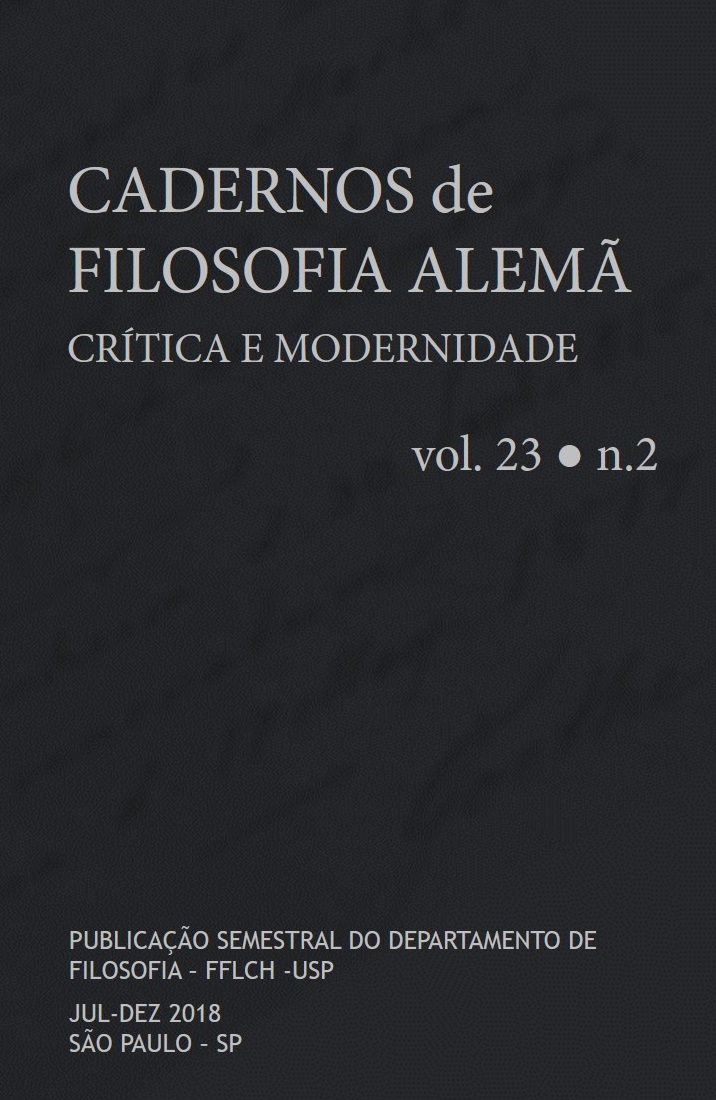My Path to Heidegger. Or: Metaphysics and the Appeal of the Question of Being
DOI:
https://doi.org/10.11606/issn.2318-9800.v23i2p53-66Keywords:
Kant, Nietzsche, Heidegger, metaphysics, ontologyAbstract
This paper traces a path of research in German philosophy, which passes by Kant, Nietzsche and, after a deviation through the controversy between Habermas and Dieter Henrich in the 1980s, ends in Heidegger. The focus of the reflection is the question of metaphysics, or, more specifically, how the problem of metaphysics is faced by each of these authors. If, in Kant, metaphysics ceases to be a discourse on objects and starts to deal with ideas (which in any case may still be objects of belief), in Nietzsche it would be, as cosmology, conceived in opposition to the Christian worldview, but also without affirming objects. The issue is taken up again in the contemporary scene by Dieter Henrich, who contrasts with the Habermasian idea of a post-metaphysical thought and points to the need to revive the field of metaphysics, in line with what some authors have done in the twentieth century - notably Martin Heidegger, for whom ontology demands a new language, capable of expressing being as such.
Downloads
References
Giacoia Jr. (2012). O. Nietzsche versus Kant: uma disputa permanente a respeito de liberdade, autonomia e dever. Rio de Janeiro: Casa do Saber.
Habermas, J. (1990). Pensamento pós-metafísico: estudos filosóficos. Rio de Janeiro: Tempo Brasileiro.
Heidegger, M. (2004). Ser e tempo, parte I. Tradução de Márcia S.C. Schuback. Petrópolis: Vozes.
____________. (2007). Nietzsche, vol. II. Tradução de Marco A. Casanova. Rio de Janeiro: Forense Universitária.
____________. (2012). Os Problemas Fundamentais da Fenomenologia. Tradução de Marco A. Casanova. Petrópolis: Vozes.
Henrich, D. (2009). O que é metafísica? O que é modernidade? Doze teses contra Jürgen Habermas. Tradução de Fernando C. Mattos. Cadernos de filosofia alemã, 14, pp.83-117.
Hulshof, M. (2013). A coisa em si entre teoria e prática: uma exigência crítica. Tese de doutorado defendida no Depto. de Filosofia da USP.
Kant, I. Prolegomena zu einer jeden künftigen Metaphysik die als Wissenschaft wird auftreten können. In: Akademie Ausgabe, vol. IV.
____________. Was heisst, sich im Denken orientieren? In: Akademie Ausgabe, vol. VIII.
____________. (2009). Fundamentação da Metafísica dos Costumes. Tradução de Guido A. de Almeida. São Paulo: Barcarolla.
____________. (2012). Crítica da razão pura. Tradução de Fernando C. Mattos. Petrópolis: Vozes.
____________. (2013). Metafísica dos costumes. Tradução de Bruno Nadai, Diego Kosbiau, Monique Hulshof. Petrópolis: Vozes.
____________. (2016). Crítica da razão prática. Tradução de Monique Hulshof. Petrópolis: Vozes.
Lebrun, G. (1993). Sobre Kant. Tradução de Rubens R. Torres Filho. et alii. São Paulo: Iluminuras.
____________. (2002). Kant e o fim da metafísica. Tradução de Carlos A. R. de Moura. São Paulo: Martins Fontes.
Marton, S. (2000). Nietzsche. Das forças cósmicas aos valores humanos. Belo Horizonte: Ed. UFMG.
Mattos, F. (1999). Kant e o problema da coisa em si. Perspectiva de uma reflexão racional. Cadernos de Filosofia Alemã, 5, pp. 27-44.
____________. (2007). Pensando Nietzsche a partir de Kant: uma radicalização do projeto crítico? Cadernos de filosofia alemã, 10, pp.51-86.
____________. (2008). Perspectivismo e democracia: uma breve reflexão sobre a política a partir do espírito livre nietzschiano. Cadernos de filosofia alemã, 12, pp.79-98.
____________. (2009). Da teoria à liberdade: a questão da objetividade em Kant. São Paulo: AM Ed..
____________. (2009a). Intersubjetivismo versus subjetivismo? Algumas considerações sobre a controvérsia Habermas-Henrich a partir das “12 teses”. Cadernos de filosofia alemã, 14, 2009, pp.55-82.
____________. (2013). Nietzsche, perspectivismo e democracia: um espírito livre em guerra contra o dogmatismo. São Paulo: Saraiva.
Nietzsche, F. (1980). Obras incompletas (coleção “Os pensadores”). Tradução de Rubens R. Torres Filho. São Paulo: Abril Cultural.
____________. (2001). A gaia ciência. Tradução de Paulo César de Souza. São Paulo: Cia. das Letras.
Downloads
Published
Issue
Section
License
Information and conceptions on the texts are complete responsibility of the authors.
All the articles submitted before July 5th 2018 and those published after July 2021 are licensed under a CC BY-NC-ND license – except those published between the aforementioned dates, which are under the CC BY-NC-SA license. The permission for the translation of the material published under the license CC BY-NC-ND by third parts can be obtained with the consent of the author.
Open access policies - Diadorim
Rules applied before July 5th 2018:
Presenting a submission to our Editorial Board implies granting priority of publication for “Cadernos de filosofia alemã”, as well as transferring the copyright of texts (once published), which will be reproduced only with the manifest authorization of the editors. Authors keep the right to reuse the texts published in future editions of their work, without paying any fees to "Cadernos”. We will not grant the permission to re-edit or translate the texts for third parts without agreement of the author.


